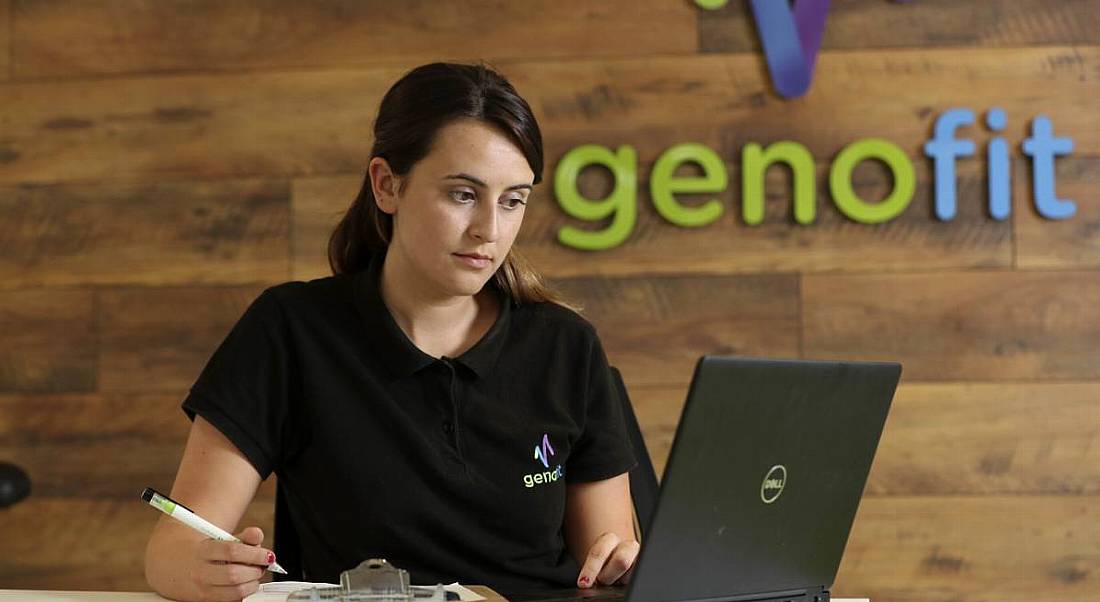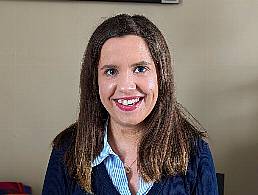Rachael Carr, a senior research assistant at Genuity Science, explains why she enjoys working in an industry that allows her to combine knowledge with people skills.
An important factor for many people in the career path they choose to take is how meaningful they find the work. For those working in research, there are plenty of opportunities for purpose-driven projects.
This has been the case for Rachael Carr, a senior research assistant at Genuity Science. As well as the combination of science and interacting with others on a daily basis, she enjoys getting to see the impacts her work has on the lives of patients.
Here, she talks about what made her decide to work in the field and why she views the Covid-19 pandemic as an opportunity for learning new skills.
‘I have learned so much over the past few months while working from home’
– RACHAEL CARR
What drew you to this career area?
I had always had an interest in science while in school and loved interacting with people. With my role, I can apply my knowledge while also interacting with people on a day-to-day basis, which is really rewarding. I also love this area as it’s always developing and there are always opportunities to learn and progress, which is extremely important to me.
What’s the best thing about working as a research assistant in this area?
The best thing is knowing the impact you have on people’s lives. As a company, we are continuously working to improve the lives of others through our research studies and partnering with pharma companies to hopefully develop better treatments for people with complex diseases.
One of the goals of our company is to improve health through genomic data, insights and innovation. It’s also such a new and developing area that it’s very exciting to see what we could accomplish in the next few years.
What’s the most exciting development you’ve witnessed in your sector since you started working in it?
The most exciting development was witnessing our rare disease programme in Temple Street help a young eight-year-old girl. She had a rare genetic order called dystonia and the condition was so rare they were unable to find a treatment for her.
Through the rare disease programme, they found she had a genetic variant and that deep brain stimulation was proven to be helpful with other patients who had the same condition. As a result, the young girl went from being on a ventilator in hospital to being home with her parents in a matter of months. I think it’s just amazing to see first-hand how the programme massively improved a patient’s life.
What aspect of this role have you struggled to get to grips with?
At the beginning, I struggled to get to grips with understanding the genetics and processing aspects of the company. My background wouldn’t be in genetics, so it was challenging at first. But over time, by attending talks and doing online courses, I was able to improve my knowledge in the area.
What’s been the hardest thing you’ve had to face in your career, and how did you overcome it?
The hardest thing was, probably like most people, the Covid-19 pandemic. Our research clinics had to close and as a result my day-to-day job and role within the company had to adapt. It was challenging. However, I saw it as an opportunity to develop new skillsets and work on projects I would normally not have the opportunity to. I have learned so much over the past few months while working from home and it has benefitted my career hugely.
If you had the power to change anything within the STEM sector, what would that be?
I would probably make it a bit more accessible to someone starting out their career. It is difficult to see when you are a new graduate what type of careers are out there in the sector and where would be best for your skillset.
Which of your personality traits makes you best suited to being a research assistant in this sector?
I am quite ambitious, which I think has helped me in my role. I am always striving to learn and develop within my role and within the company. This has helped me take on new tasks without hesitation and has opened opportunities for me to progress. Especially in such a new area and setting up new research sites, I think it is important to not be afraid to take on new challenges.
Is there something in your personal life that helps you or has helped you in your job?
A lot of people in my family have suffered from breast cancer. The BRCA1 gene mutation runs in my family, so that would significantly increase your risk. Members of my family have been tested for the gene and can now take preventive measures to reduce their risk of getting breast cancer, which 10 years ago wouldn’t have been possible.
That’s why I love working for a company that is striving to do the same for so many other complex diseases. I have seen the massive impact these discoveries can have on people’s lives, which reminds me why we do what we do as a company.
How do you make connections with others in the STEM community?
I make connections through LinkedIn or through conferences in the past.
Has mentorship or coaching been important in your career?
Yes, although I am still relatively new in my career, I have received excellent mentorship from senior staff members and they have really helped me progress both personally and professionally. I’m also involved in the transition-year programme we run in the company, which gives students an opportunity to see the different aspects of the company and different career paths possible.
What advice would you give to someone thinking about a career in your area?
I would say be open minded about going for roles outside of your study concentration in college. As STEM is such a broad area, there is always an opportunity to develop your skills and end up in an area you never thought you would have.




